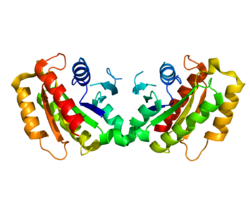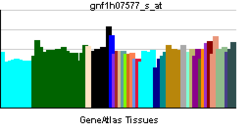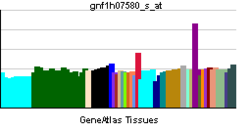- LRRK2
-
Leucine-rich repeat kinase 2 (LRRK2), also known as dardarin, is an enzyme that in humans is encoded by the LRRK2 gene.[1] LRRK2 is a member of the leucine-rich repeat kinase family. Variants of this gene are associated with an increased risk of Parkinson's disease and also Crohn's disease.[1][2]
Contents
Function
The LRRK2 gene encodes a protein with an ankyrin repeat region, a leucine-rich repeat (LRR) domain, a kinase domain, a DFG-like motif, a RAS domain, a GTPase domain, an MLK-like domain, and a WD40 domain. The protein is present largely in the cytoplasm but also associates with the mitochondrial outer membrane.
LRRK2 interacts with the C-terminal R2 RING finger domain of parkin, and parkin interacted with the COR domain of LRRK2. Expression of mutant LRRK2 induced apoptotic cell death in neuroblastoma cells and in mouse cortical neurons.[3]
Clinical significance
Mutations in this gene have been associated with Parkinson's disease type 8.[4]
The Gly2019Ser mutation in LRRK2 is a relatively common cause of familial Parkinson's Disease in Caucasians.[5] It may also cause sporadic Parkinson's Disease. The mutated Gly amino acid is conserved in all kinase domains of all species.
The Gly2019Ser mutation is one of a small number of LRRK2 mutations proven to cause Parkinson's disease. Of these, Gly2019Ser is the most common in the Western World, accounting for ~2% of all Parkinson's disease cases in North American Caucasians. This mutation is enriched in certain populations, being found in approximately 20% of all Ashkenazi Jewish Parkinson's disease patients and in approximately 40% of all Parkinson's disease patients of North African Berber Arab ancestry.
Unexpectedly, genomewide association studies have found an association between LRRK2 and Crohn's disease as well as with Parkinson's disease, suggesting that the two diseases share common pathways.[6][7]
References
- ^ a b Paisán-Ruíz C, Jain S, Evans EW, Gilks WP, Simón J, van der Brug M, López de Munain A, Aparicio S, Gil AM, Khan N, Johnson J, Martinez JR, Nicholl D, Carrera IM, Pena AS, de Silva R, Lees A, Martí-Massó JF, Pérez-Tur J, Wood NW, Singleton AB (November 2004). "Cloning of the gene containing mutations that cause PARK8-linked Parkinson's disease". Neuron 44 (4): 595–600. doi:10.1016/j.neuron.2004.10.023. PMID 15541308.
- ^ Zimprich A, Biskup S, Leitner P, Lichtner P, Farrer M, Lincoln S, Kachergus J, Hulihan M, Uitti RJ, Calne DB, Stoessl AJ, Pfeiffer RF, Patenge N, Carbajal IC, Vieregge P, Asmus F, Müller-Myhsok B, Dickson DW, Meitinger T, Strom TM, Wszolek ZK, Gasser T (November 2004). "Mutations in LRRK2 cause autosomal-dominant parkinsonism with pleomorphic pathology". Neuron 44 (4): 601–7. doi:10.1016/j.neuron.2004.11.005. PMID 15541309.
- ^ Smith WW, Pei Z, Jiang H, Moore DJ, Liang Y, West AB, Dawson VL, Dawson TM, Ross CA (December 2005). "Leucine-rich repeat kinase 2 (LRRK2) interacts with parkin, and mutant LRRK2 induces neuronal degeneration". Proc. Natl. Acad. Sci. U.S.A. 102 (51): 18676–81. doi:10.1073/pnas.0508052102. PMC 1317945. PMID 16352719. http://www.pubmedcentral.nih.gov/articlerender.fcgi?tool=pmcentrez&artid=1317945.
- ^ "Entrez Gene: LRRK2 leucine-rich repeat kinase 2". http://www.ncbi.nlm.nih.gov/sites/entrez?Db=gene&Cmd=ShowDetailView&TermToSearch=120892.
- ^ Gilks WP, Abou-Sleiman PM, Gandhi S, Jain S, Singleton A, Lees AJ, Shaw K, Bhatia KP, Bonifati V, Quinn NP, Lynch J, Healy DG, Holton JL, Revesz T, Wood NW (February 2005). "A common LRRK2 mutation in idiopathic Parkinson's disease". The Lancet 365 (9457): 415–6. doi:10.1016/S0140-6736(05)17830-1. PMID 15680457.
- ^ Manolio TA; Guttmacher, Alan E.; Manolio, Teri A. (July 2010). "Genomewide Association Studies and Assessment of the Risk of Disease". N Engl J Med 363 (2): 166–176. doi:10.1056/NEJMra0905980. PMID 20647212.
- ^ IPDGC; Nalls, MA; Plagnol, V; Hernandez, DG; Sharma, M; Sheerin, UM; Saad, M; Simón-Sánchez, J et al. (Feb 2011). "GImputation of sequence variants for identification of genetic risks for Parkinson's disease: a meta-analysis of genome-wide association studies". The Lancet 377 (9766): 641–649. doi:10.1016/S0140-6736(10)62345-8. PMID 21292315.
Further reading
- Singleton AB (2005). "Altered alpha-synuclein homeostasis causing Parkinson's disease: the potential roles of dardarin". Trends Neurosci. 28 (8): 416–21. doi:10.1016/j.tins.2005.05.009. PMID 15955578.
- Mata IF, Wedemeyer WJ, Farrer MJ, et al. (2006). "LRRK2 in Parkinson's disease: protein domains and functional insights". Trends Neurosci. 29 (5): 286–93. doi:10.1016/j.tins.2006.03.006. PMID 16616379.
- Haugarvoll K, Wszolek ZK (2006). "PARK8 LRRK2 parkinsonism". Current neurology and neuroscience reports 6 (4): 287–94. doi:10.1007/s11910-006-0020-0. PMID 16822348.
- Bonifati V (2006). "The pleomorphic pathology of inherited Parkinson's disease: lessons from LRRK2". Current neurology and neuroscience reports 6 (5): 355–7. doi:10.1007/s11910-996-0013-z. PMID 16928343.
- Schapira AH (2006). "The importance of LRRK2 mutations in Parkinson disease". Arch. Neurol. 63 (9): 1225–8. doi:10.1001/archneur.63.9.1225. PMID 16966498.
- Whaley NR, Uitti RJ, Dickson DW, et al. (2006). "Clinical and pathologic features of families with LRRK2-associated Parkinson's disease". J. Neural Transm. Suppl.. Journal of Neural Transmission. Supplementa 70 (70): 221–9. doi:10.1007/978-3-211-45295-0_34. ISBN 978-3-211-28927-3. PMID 17017533.
- Gasser T (2006). "Molecular genetic findings in LRRK2 American, Canadian and German families". J. Neural Transm. Suppl.. Journal of Neural Transmission. Supplementa 70 (70): 231–4. doi:10.1007/978-3-211-45295-0_35. ISBN 978-3-211-28927-3. PMID 17017534.
- Tan EK (2007). "Identification of a common genetic risk variant (LRRK2 Gly2385Arg) in Parkinson's disease". Ann. Acad. Med. Singap. 35 (11): 840–2. PMID 17160203.
External links
Categories:- Human proteins
- Chromosome 12 gene stubs
Wikimedia Foundation. 2010.



